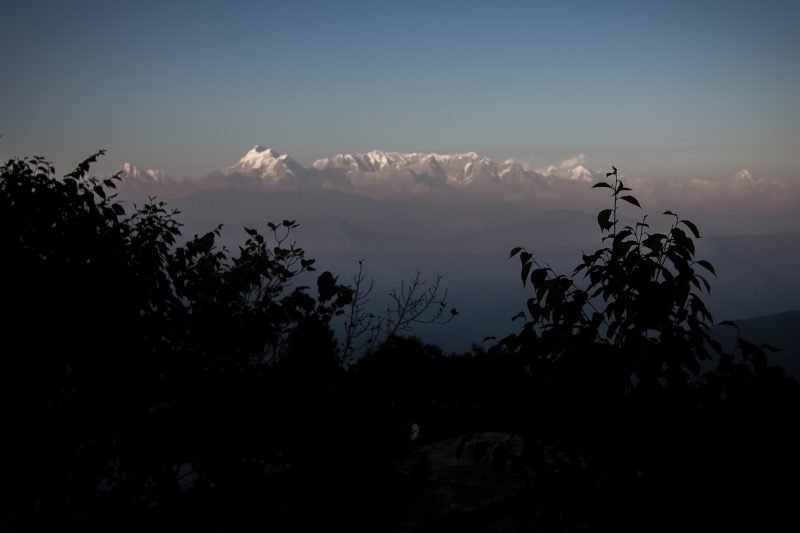Search for climbers in India’s Himalayas to resume at first light
Scores of emergency workers were combing the peaks in two helicopters and on foot as rescue operations entered a second day (Agnes BUN)
New Delhi (AFP) – An increasingly desperate search for eight climbers missing after an avalanche in the Indian Himalayas was called off due to poor weather but will resume at first light on Monday, officials said.
The four Britons, two Americans, one Indian and one Australian have been unaccounted for since Friday on the 7,826-metre (25,643-foot) Nanda Devi, India’s second-highest mountain.
Two helicopters and scores of emergency workers combed the area on Sunday for a second day, but the search was called off in the early afternoon due to heavy cloud coverage, a local official told AFP.
Vijay Kumar Jogdande, a magistrate in the Pithoragarh district where the mountain is located, said it would begin again at 5:00 am on Monday (2330 GMT Sunday) — weather permitting.
“We are hopeful to get some clues but its not an easy task,” said Jogdande.
He said the climbers were likely trekking heights above 6,000 metres when the avalanche struck after heavy snowfall.
According to a May 22 Facebook post by Moran Mountain, a company run by expedition chief and experienced British mountaineer Martin Moran, the group was set to attempt “an unclimbed peak” at 6,477 metres.
They were expected to report back to the Munsiyari base camp on May 26, but a porter stationed at the camp reported to authorities that the group remained missing on May 31, prompting the search operation.
On Sunday authorities said that four other British climbers who were not part of the larger group but were in touch with them until May 26, had been rescued.
“They were climbing separately but were in touch with the larger group. Heavy snowfall and bad weather had left them stuck at the base camp,” R.C. Rajguru, Pithoragarh police chief, told AFP.
– ‘No sign’ –
A statement by the Moran family on Sunday said they have been informed by the Indian Mountaineering Federation that the air search has “revealed the scale of the avalanche but no sign of the climbers, their equipment nor their tents.”
“We are pressing for the search area to be widened and continued until such time as firm evidence is found to ascertain the well being or otherwise of all those in the climbing group,” the statement posted on the Moran Mountain Facebook page said.
They added that they were “deeply saddened by the tragic events unfolding” and expressed gratitude for the search operations being undertaken “under extremely difficult conditions”.
The Sydney Morning Herald named the Australian member as British-born Ruth McCance.
It quoted her husband Trent Goldsack as saying that her last communication to him had been a text message around a week ago saying: “OK at base camp.”
He said that his wife had been nervous and excited before the trip and “certainly wasn’t blase about it”.
“Ever since I’ve known her, this is something she has wanted to do. She’s an amazing woman,” he said.
“They basically went dark after they left Delhi, but that was expected. She’s done this stuff before.”
Another of the British climbers was reported to be Richard Payne, a lecturer at the University of York.
“We are aware of the news reports and can confirm that one of our lecturers Dr Richard Payne travelled to the Himalayas on holiday,” a spokesman for the British university said.
“We remain extremely concerned for his safety and our thoughts are with his family, friends and colleagues at this difficult time.”
Hundreds of climbers from across the world visit India to scale mountains located across the Himalayan belt, but the twin peaks of Nanda Devi are the toughest to scale.
The first successful ascent to the Nada Devi summit was in 1936.
India has 10 peaks above 7,000 metres, including Kangchenjunga — the world’s third highest — sandwiched between India and Nepal.
Four Indians were among 11 climbers that died climbing Mount Everest in the latest season that ended in recent days amid allegations of overcrowding on the world’s highest peak.
Mountaineering experts criticised the government of Nepal for giving permits to anyone ready to pay $11,000, letting rookie climbers risk their lives and those of others on the slopes.
Disclaimer: Validity of the above story is for 7 Days from original date of publishing. Source: AFP.


